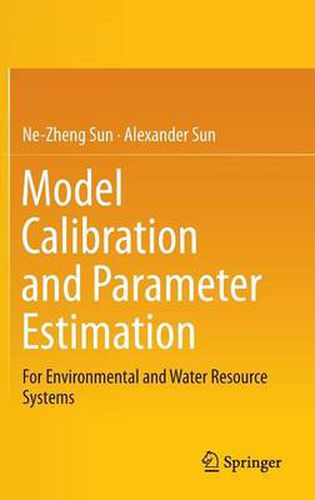Readings Newsletter
Become a Readings Member to make your shopping experience even easier.
Sign in or sign up for free!
You’re not far away from qualifying for FREE standard shipping within Australia
You’ve qualified for FREE standard shipping within Australia
The cart is loading…






This title is printed to order. This book may have been self-published. If so, we cannot guarantee the quality of the content. In the main most books will have gone through the editing process however some may not. We therefore suggest that you be aware of this before ordering this book. If in doubt check either the author or publisher’s details as we are unable to accept any returns unless they are faulty. Please contact us if you have any questions.
This three-part book provides a comprehensive and systematic introduction to these challenging topics such as model calibration, parameter estimation, reliability assessment, and data collection design. Part 1 covers the classical inverse problem for parameter estimation in both deterministic and statistical frameworks, Part 2 is dedicated to system identification, hyperparameter estimation, and model dimension reduction, and Part 3 considers how to collect data and construct reliable models for prediction and decision-making.
For the first time, topics such as multiscale inversion, stochastic field parameterization, level set method, machine learning, global sensitivity analysis, data assimilation, model uncertainty quantification, robust design, and goal-oriented modeling, are systematically described and summarized in a single book from the perspective of model inversion, and elucidated with numerical examples from environmental and water resources modeling. Readers of this book will not only learn basic concepts and methods for simple parameter estimation, but also get familiar with advanced methods for modeling complex systems. Algorithms for mathematical tools used in this book, such as numerical optimization, automatic differentiation, adaptive parameterization, hierarchical Bayesian, metamodeling, Markov chain Monte Carlo, are covered in details.
This book can be used as a reference for graduate and upper level undergraduate students majoring in environmental engineering, hydrology, and geosciences. It also serves as an essential reference book for professionals such as petroleum engineers, mining engineers, chemists, mechanical engineers, biologists, biology and medical engineering, applied mathematicians, and others who perform mathematical modeling.
$9.00 standard shipping within Australia
FREE standard shipping within Australia for orders over $100.00
Express & International shipping calculated at checkout
This title is printed to order. This book may have been self-published. If so, we cannot guarantee the quality of the content. In the main most books will have gone through the editing process however some may not. We therefore suggest that you be aware of this before ordering this book. If in doubt check either the author or publisher’s details as we are unable to accept any returns unless they are faulty. Please contact us if you have any questions.
This three-part book provides a comprehensive and systematic introduction to these challenging topics such as model calibration, parameter estimation, reliability assessment, and data collection design. Part 1 covers the classical inverse problem for parameter estimation in both deterministic and statistical frameworks, Part 2 is dedicated to system identification, hyperparameter estimation, and model dimension reduction, and Part 3 considers how to collect data and construct reliable models for prediction and decision-making.
For the first time, topics such as multiscale inversion, stochastic field parameterization, level set method, machine learning, global sensitivity analysis, data assimilation, model uncertainty quantification, robust design, and goal-oriented modeling, are systematically described and summarized in a single book from the perspective of model inversion, and elucidated with numerical examples from environmental and water resources modeling. Readers of this book will not only learn basic concepts and methods for simple parameter estimation, but also get familiar with advanced methods for modeling complex systems. Algorithms for mathematical tools used in this book, such as numerical optimization, automatic differentiation, adaptive parameterization, hierarchical Bayesian, metamodeling, Markov chain Monte Carlo, are covered in details.
This book can be used as a reference for graduate and upper level undergraduate students majoring in environmental engineering, hydrology, and geosciences. It also serves as an essential reference book for professionals such as petroleum engineers, mining engineers, chemists, mechanical engineers, biologists, biology and medical engineering, applied mathematicians, and others who perform mathematical modeling.